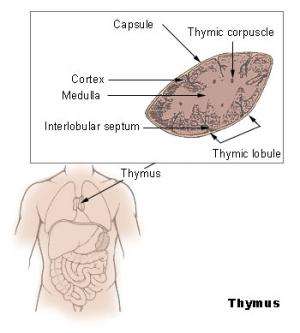March 31, 2015 report
Researchers find importance of regulatory T-cells generated early in life

(MedicalXpress)—Originating in the thymus, the autoimmune regulator (Aire) protein controls a key mechanism that prevents the immune system from attacking the body itself. Individual T cells attack different substances; Aire promotes immunological tolerance by producing a repertoire of mRNA transcripts that encode proteins characteristic of the body's differentiated cell types. Peptides derived from these proteins are displayed on major histocompatibility complex molecules on the surfaces of medullary epithelial cells in the thymus.
In the first few weeks of life, Aire expression prevents autoimmune-caused organ failure characteristic of individuals with APECED (autoimmune polyendocrinopathy-candidiasis-ectodermal dystrophy), which is observed in Aire-KO (Aire knockout) mice. The pathology of the disease presents a mystery: Why is such a limited set of tissues susceptible to autoimmune attack in the absence of Aire? A collaborative of researchers from Boston, MA and Korea have conducted a study into the importance of perinatal expression of Aire and how its presence differs in the immune systems of adult mice.
The researchers first examined the thymus of both young and old Aire-WT and Aire-KO mice, finding that in both perinatal and adult mice, Aire was expressed on the surfaces of the epithelial cells. The deactivation of B cells that express self-antigens is called clonal deletion; Aire-dependent clonal deletion was observed in both perinatal and adult mice.
The researchers then tested the importance of T-regulator (Treg) cell compartments in the thymus for maintaining immunological tolerance. They observed the presence of Tregs two days after birth, which developed into substantial populations at four days old. This increase continued through 35 days. An analysis of mice aged zero to 10 days following Treg ablation showed the multi-organ autoimmunity characteristic of Aire-KO mice, but for mice at the 35- to 45-day window, Treg ablation had no significant effect on either weight gain or survival.
Further confirmation of this finding led the researchers to conclude that Aire promotes the generation of Treg cells during the perinatal age window. The researchers then applied an inducible Treg lineage-tracer system to establish the phenotypic properties of perinatally generated Tregs. They easily distinguished adult-tagged and perinate-tagged Treg populations and discovered that perinate-tagged Tregs dwindled to a minor percentage of the compartment population between one and eight weeks after cessation of the tracer experiment.
This persistence allowed the researchers to study the functionality of perinatally generated Tregs. Their findings strongly suggest that perinatally generated populations of Tregs express distinct functions that persist into adulthood. The introduction of adult Treg populations into Aire-KO mice did not ameliorate the symptoms of autoimmune disease; by contrast, administering perinatally generated Tregs into the deficient mice produced a substantial reversal of Aire-KO pathology.
The researchers also sought a molecular or cellular explanation for the differences in the Treg compartments of perinatal and adult mice, finding that the repertoires of peptides presented by perinatal and adult medullary epithelial cells differ, with adult populations appearing to be more limited.
From the accumulated data, the researchers conclude that Aire's ability to promote the generation of specific Tregs accounts for its importance during the perinatal age window. "Given the age-dependent differences in antigen processing machinery and presenting cells we documented, juvenile and older mice are likely to have distinct repertoires of both Aire-dependent and Aire-independent Tregs," they write.
Further, the perinatally generated Treg compartment in the thymus is particularly suited to protecting a defined set of tissues from autoimmune attack with little overlap with the set of tissues protected by adult Treg activity. "An important implication of this dichotomy is that therapies based on transfer of Tregs isolated from adult donors may not be able to impact a particular subset of autoimmune diseases," the researchers observe.
More information: "Regulatory T cells generated early in life play a distinct role in maintaining self-tolerance." Science. DOI: 10.1126/science.aaa7017
ABSTRACT
Aire is an important regulator of immunological tolerance, operating in a minute subset of thymic stromal cells to induce transcripts encoding peptides that guide T-cell selection. Expression of Aire during a perinatal age-window is necessary and sufficient to prevent the multi-organ autoimmunity characteristic of Aire-deficient mice. We report that Aire promotes the perinatal generation of a distinct compartment of Foxp3+CD4+ regulatory T (Treg) cells, which stably persists in adult mice. This population has a role in maintaining self-tolerance, transcriptome and activation profile distinguishable from those of Tregs produced in adults. Underlying the distinct Treg populations are age-dependent, Aire-independent differences in the processing and presentation of thymic stromal-cell peptides, resulting in different T-cell receptor repertoires. Our findings expand the notion of a developmentally layered immune system.
© 2015 MedicalXpress.com















